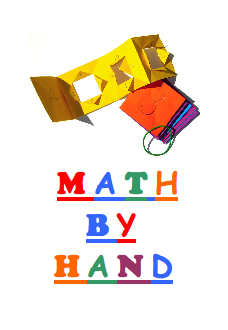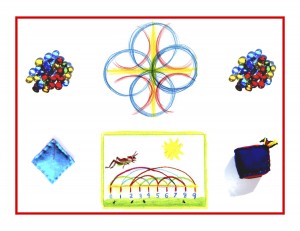Day 76
For one year, 365 days, this blog will address the Common Core Standards from the perspective of creating an alternate, ambient learning environment for math. Ambient is defined as “existing or present on all sides, an all-encompassing atmosphere.” And ambient music is defined as: “Quiet and relaxing with melodies that repeat many times.”
Why ambient? A math teaching style that’s whole and all encompassing, with themes that repeat many times through the years, is most likely to be effective and successful. Uh oh, I know we’re all wanting to get back to the Common Core (are we?) but I’m taking another day here to post Jean Piaget’s stages of growth and development. Piaget (1896 – 1980) was a Swiss psychologist who was the first to systematically study cognitive development. Before his work, the common assumption in psychology was that children are merely less competent thinkers than adults. Piaget showed that children think in very different ways than adults, and that their cognitive development consistently follows a series of stages.
Piaget said, “The principle goal of education in the schools should be creating men and women who are capable of doing new things, not simply repeating what other generations have done.” And, “Only education is capable of saving our societies from possible collapse, whether violent or gradual.” Relevant words for today, and a possible wake-up call that we need to proceed thoughtfully and cautiously when instituting changes in educational policy. In light of this and in light of the controversy it’s raising, we may need to reevaluate the wisdom and effectiveness of the Common Core.
Good old Wikipedia supplied this summary of Piaget’s theory. It closely parallels Steiner and the Waldorf philosophy, in the recognition that the child is not ready to be formally taught until age 7, and that from ages 7 to 11 is not able to learn abstractly, but rather needs to be taught concretely. To this Steiner added the idea that the natural language of the child at this age is not only concrete but also rooted in the pictorial and artistic. Here are Piaget’s stages, and please do read them with the abstract nature of the Common Core Standards for Grades K-6 in mind.
Sensorimotor Stage: Ages 0 to 2
The sensorimotor stage is the first of the four stages in cognitive development which “extends from birth to the acquisition of language.” In this stage, infants progressively construct knowledge and understanding of the world by coordinating experiences with objects. Infants gain knowledge of the world from the physical actions they perform within it. They progress from reflexive, instinctual action at birth to the beginning of symbolic thought toward the end of the stage.
Pre-Operational Stage: Ages 2 to 7
Piaget’s second stage, the pre-operational stage, starts when the child begins to learn to speak at age two and lasts up until the age of seven. During the Pre-operational Stage of cognitive development, Piaget noted that children do not yet understand concrete logic and cannot mentally manipulate information. Children’s increase in playing and pretending takes place in this stage. The pre-operational stage is sparse and logically inadequate in regard to mental operations. The child is able to form stable concepts as well as magical beliefs. The child, however, is still not able to perform operations, which are tasks that the child can do mentally, rather than physically.
Symbolic function substage: Ages 2 to 4
At about two to four years of age, children cannot yet manipulate and transform information in a logical way. However, they now can think in images and symbols. Other examples of mental abilities are language and pretend play. Symbolic play is when children develop imaginary friends or role-play with friends. Children’s play becomes more social and they assign roles to each other. Some examples of symbolic play include playing house, or having a tea party.
Intuitive Thought Substage: Ages 4 to 7
At between about the ages of 4 and 7, children tend to become very curious and ask many questions, beginning the use of primitive reasoning. There is an emergence in the interest of reasoning and wanting to know why things are the way they are. Piaget called it the “intuitive substage” because children realize they have a vast amount of knowledge, but they are unaware of how they acquired it.
Concrete Operational Stage: Ages 7 to 11
The concrete operational stage is the third of four stages from Piaget’s theory of cognitive development. This stage, which follows the preoperational stage, occurs between the ages of seven and 11 years, and is characterized by the appropriate use of logic. During this stage, a child’s thought processes become more mature and “adult like”. They start solving problems in a more logical fashion. Abstract, hypothetical thinking has not yet developed, and children can only solve problems that apply to concrete events or objects. Piaget determined that children are able to incorporate inductive reasoning. Inductive reasoning involves drawing inferences from observations in order to make a generalization. In contrast, children struggle with deductive reasoning, which involves using a generalized principle in order to try to predict the outcome of an event. Children in this stage commonly experience difficulties with figuring out logic in their heads. For example, a child will understand that “A is more than B” and “B is more than C”. However, when asked “is A more than C?”, the child might not be able to logically figure the question out in their heads.
Formal Operational Stage: Ages 11 to 15-20
The final stage is known as the formal operational stage (adolescence and into adulthood, roughly ages 11 to approximately 15-20): Intelligence is demonstrated through the logical use of symbols related to abstract concepts. At this point, the person is capable of hypothetical and deductive reasoning. During this time, people develop the ability to think about abstract concepts.
Knowledge ensues in an environment dedicated to imaginative, creative knowing, where student and teacher alike surrender to the ensuing of that knowledge as a worthy goal. We will go back to the CCSS ELA Standards tomorrow!












